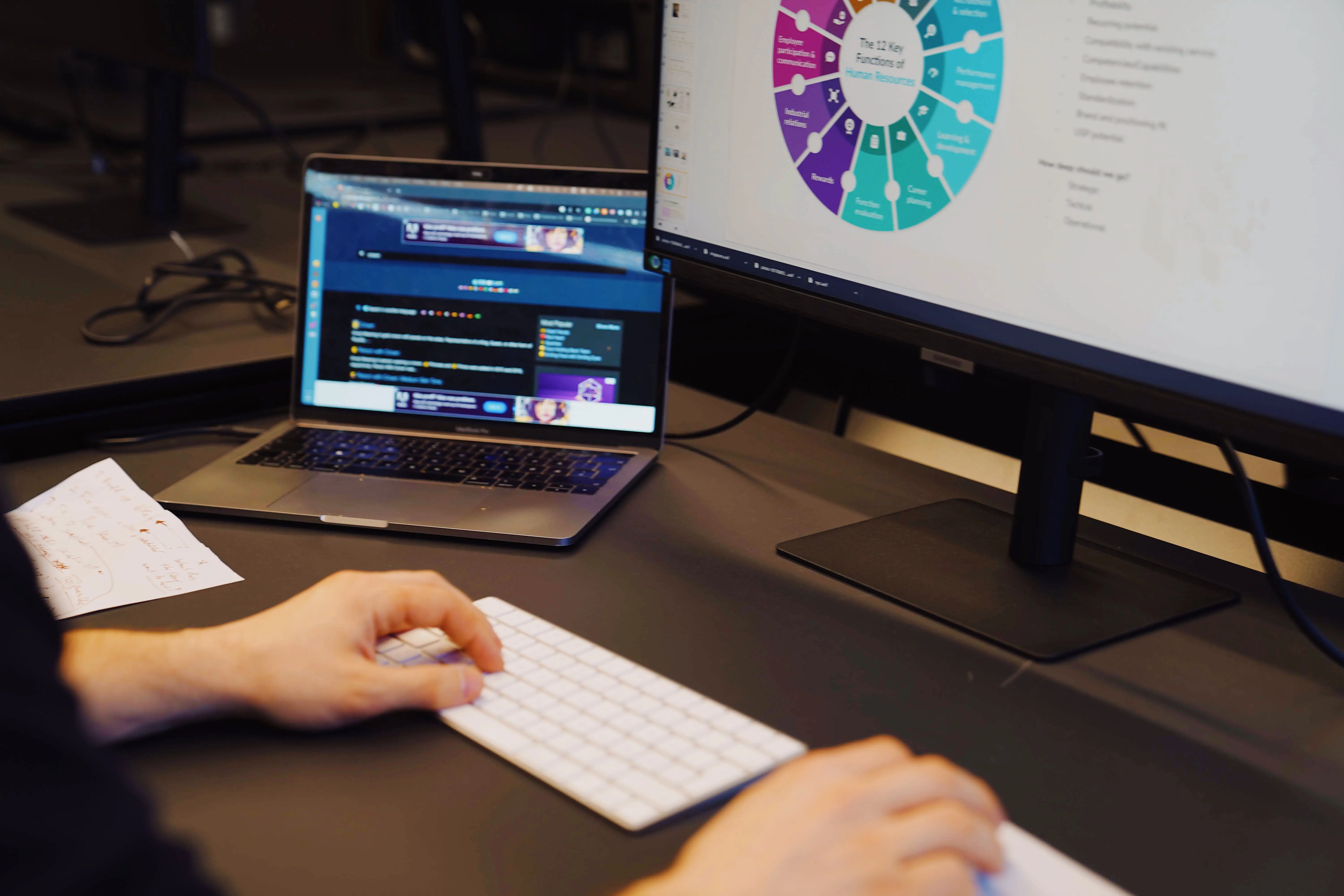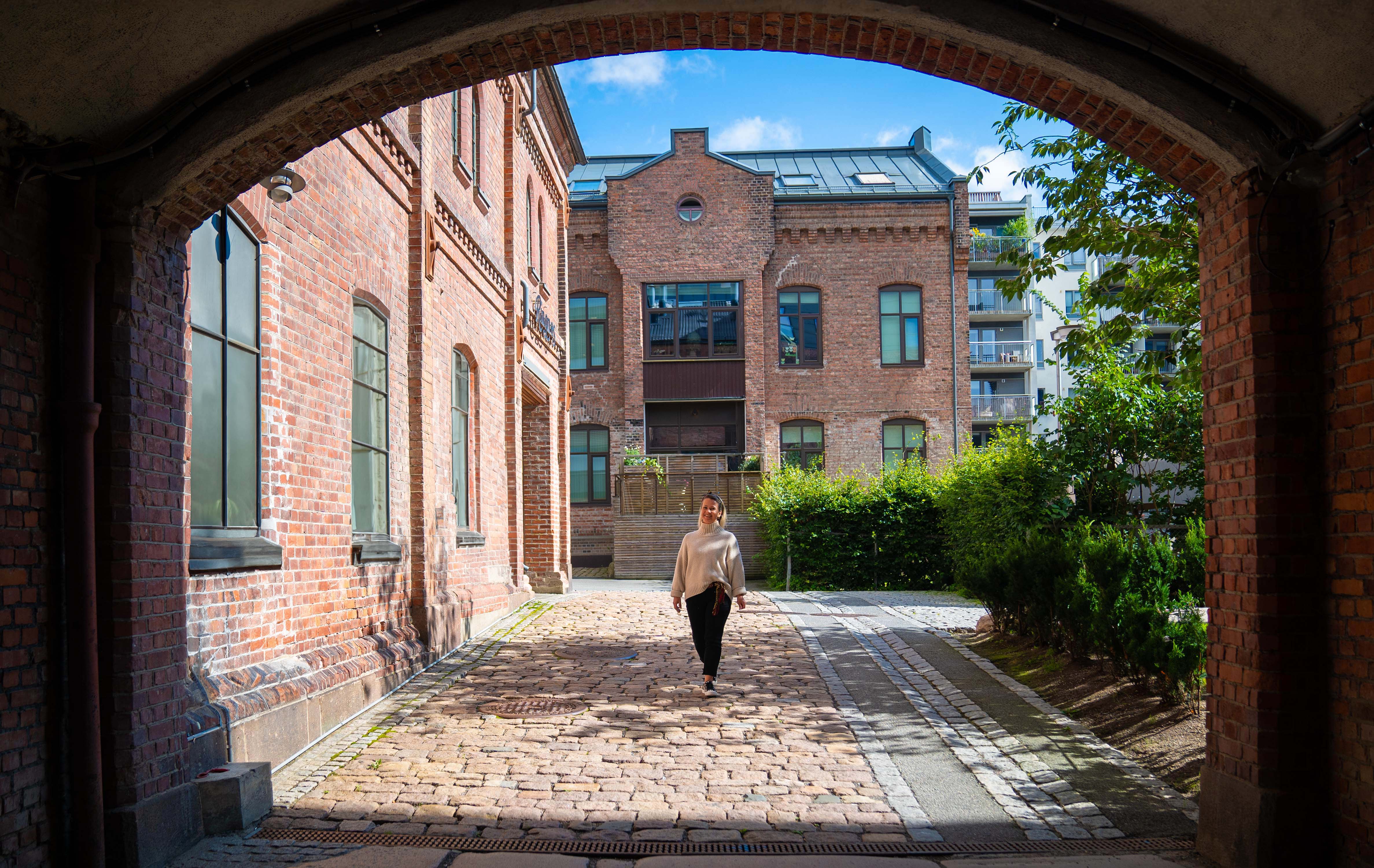
Behind the Brand: Magda
Welcome to Behind the Brand - a series that highlights our employees and the topics within talent acquisition and HR that they are passionate about. In this edition, Recruitment Consultant, Magda talks about the future of work and what it means for employees and employers alike.
We’ve always felt that the people are really what makes Amby, Amby.
Which is why we wanted to create our Behind the Brand - a written series that highlights our employees and the topics within talent acquisition and HR that they are passionate about.
In this edition, we're talking to Recruitment Consultant, Magda. Based in Poland, Magda has been with Amby since before our rebrand back in 2021, and since joining has become a critical part of dozens of hiring processes. Whether it’s growing Superside’s fully remote team is hyperscale or testing out new AI tools for her fellow Ambyans, Magda’s impact spans our internal team and that of several clients.
Can you tell us a bit about yourself and your background?
I’m from Poznań, a Polish city famous for its 1,001 ways to cook potatoes (and yes, they’re all delicious!). I have a Master’s in Psychology focusing on Work and Organizational Psychology and I also had an opportunity to study abroad for a while during my Erasmus+ exchange. 
I’ve been with Amby for 3,5 years now and, as a part of the remote team, I’ve had the pleasure of working with some amazing tech companies, helping them revolutionize industries by bringing in top talent. I have worked with several processes targeting both local and global talent pools, and I am always amazed by how rewarding it is to close a project with a happy client, and an even happier candidate.
What drew you to recruitment?
I have always been fascinated by how the human mind works, so Psychology was a natural choice for me. But while I didn’t see myself becoming a therapist, I still wanted to help people in some way.
During my studies, I saw there was an opportunity to do so by optimizing their work environment (after all, we spend 1/3 of our life there, so it seems pretty significant, right?). And what better way to make people happier at work than by helping them find a job they genuinely enjoy, in a company that really gets them?
On top of that, as a recruiter, I also advise companies on how to attract and keep the best talent, and how to adapt to what today’s employees are really looking for.
"We spend 1/3 of our life at work, so optimizng our happiness there seems pretty significant, right?"
What’s been the biggest shift in modern job market?
In today’s job market, and especially within the tech sector, we have seen a change in the balance of power. It’s no longer the employer calling all the shots - candidates are now in control. In many cases, there are more open positions than people to fill them, so candidates can afford to be picky. This means that companies have to do more than offer a paycheck and basic benefits to stand out.
These days, people aren’t just looking for another job—they want to feel like their work has a purpose and fits into their lifestyle (again, we spend 1/3 of our lives at work, so this makes perfect sense). This means that salary alone isn’t enough anymore, it’s about offering something that resonates with what people value in their personal life as well.
And it doesn’t stop with hiring. You also have to keep your employees happy once they’re on board. While other companies are stepping up with new benefits, shorter work weeks, and more flexibility, sticking to the same setup you had 5 or 10 years ago could mean falling behind. To stay ahead, you have to keep up with what today’s employees want - because at the end of the day, they’re your most important asset.
What does this mean for employer looking to attract and retain top talent?
The way organizations have worked has changed a lot in the last 100 years, with big shifts in management styles, technology, and what people expect from work.
We have moved from rigid, hierarchical, and standardized production models typical for the early 19th-century Fordism to more flexible, decentralized, and knowledge-driven approaches. We see AI, decentralized work, and a stronger focus on well-being shaping the way organizations function moving forward. With Millenials and Gen Z forecasted to make up around 70% of the global workforce by 2030, companies need to find a healthy balance between what makes employees happy and what works well for the business, which at times may be opposing forces.
How can employer adapt to this change?
There are essentially four areas of work that changed radically and will undoubtedly continue to evolve. There are for sure a lot more developments out there, but here are the main shifts I’m seeing and how I think companies can adapt.
1. Promote flexibility where you can
For many employees, it is no longer a discussion about being able to work from home on a Friday or leave earlier for a doctor’s appointment. The current expectations shift to having the type of flexibility at work that lets them integrate their responsibilities with their lifestyle/personal life seamlessly. This can mean anything from working fully remotely to take care of your kids, to working from anywhere and fulfilling your dreams of traveling the world without taking a sabbatical.
Apart from work location, employees are also looking for a more flexible approach to working hours. The current average number of working hours is generally a lot lower, compared to the 19th century and it can be taken a step further now by introducing the 4-day work week. Even though the concept of it is not new, it has not become a standard yet so implementing it at this point can give you a competitive advantage on the market.
NB! Always consider what works for your employees and your organization and if you choose to implement it, make sure you keep a good balance and have the necessary resources to manage the new setup. Each of your employees can have a different preference so the best policy is to give them a choice!
2. Make diversity a key part of your hiring process
Companies around the world see the benefits of having a fully remote workforce, including introducing greater diversity in the teams, which was less possible when the teams had to be tied to a specific location, with its members often sharing a similar background.
Now, with remote work and people relocating more easily, teams are far more diverse than they have been before. Taking my own personal experience as an example, I’m Polish, spend a lot of my time traveling around Europe, all while working for a Norwegian company. This is not something that would have been the norm (or even possible) just 10-15 years ago.
This is a huge advantage, especially when you're looking for niche tech talent—you’re no longer limited by geography. Plus, a lot of people actually enjoy working in international teams.
However, cultural diversity in teams can be a bit of a double-edged sword. While it can boost creativity and satisfaction, it can also lead to challenges like task conflict and less social integration. The key is having the right processes in place—things like good conflict management, strong team experience, and a positive team climate—so that diversity helps team performance rather than holding it back.
3. Re-evaluate your leadership style
Leadership styles have also shifted over the years. Not that long ago, autocratic leadership was the norm—managers made decisions with little input from employees, and the focus was strictly on getting things done, no matter what. But as the workplace evolved, so did leadership. These days, it’s more about collaboration and adaptability. Leaders now often rely on their teams for input, and decision-making has become a more democratic process, which boosts employee engagement and ownership.
Modern leaders act more like enablers than traditional managers. Instead of just directing, they help employees play to their strengths by giving them the resources they need to succeed. Qualities like empathy and emotional intelligence—rarely mentioned in the past—are now seen as crucial for good leadership. And with remote work becoming a big part of the picture, leaders are also adapting their management styles to build trust, communicate effectively, and foster collaboration in virtual teams.
4. Recognize nuances in approaches to work
The way people see their work is another thing that changed, especially for Millennials and Gen Z. In the past, work was a huge part of who you were, and staying loyal to one company for years was the norm. But today, it’s different. Work is more about what you do, not who you are. And job-hopping, once seen as a negative, is now pretty common, especially among younger generations. They tend to switch jobs more frequently, looking for better opportunities, flexibility, and a work-life balance that fits their needs.
This shift also shows how much more individualistic work has become. People now prioritize their personal goals and how well their jobs fit their lives, instead of sticking with one company forever. To keep up with this, businesses are starting to realize that they need to offer more flexibility and create environments that match these new expectations if they want to hold on to top talent.

What does this mean for you and other recruiters?
To wrap it all up, companies today need to be proactive about how they present themselves as employers. It's not just about offering a job anymore—it's about showing that they understand and support the modern employee’s expectations. Including these modern trends in your employer branding strategy is key. Candidates want to see what you're doing about these things, not just hear empty promises.
If you can clearly show how you’re about to embrace flexible work policies, diversity, innovation, and respect for individuality and career growth, you’ll be much more likely to attract the kind of talent you want. Showcasing these intangible aspects of your brand in a tangible way can be tricky, but I see it often done through case studies, employee testimonials, or showcasing what you’re already doing to promote flexibility and individuality.
With that said, don’t let the pendulum swing too far. As we often say about employer branding, your brand isn’t for everyone and that’s okay. You shouldn’t bend over backwards to make exceptions for “star” candidates that go against what’s in the best interest of your company. For example, if you’re a hardware company, it would make sense that you don’t have an ultra-flexible remote policy. After all, your employees need to be onsite to work with the technology. In other words, don’t get overly wrapped up in trends or candidate demands for the sake of being seen as a modern workplace. This will only muddy your brand, hurt your culture, and increase turnover in the longrun.
.jpg)
Meagan Leber
Growth Marketing Manager at Amby, who loves writing about the tech, venture capital, and people space.
LinkedIn



